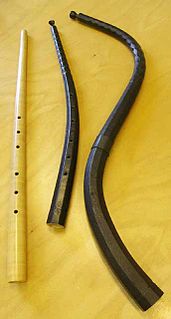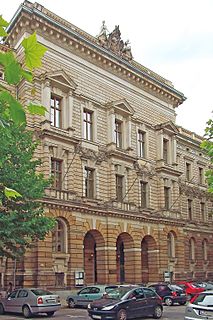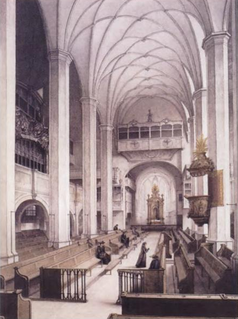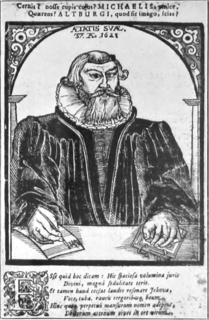External links
| This German musical biography article is a stub. You can help Wikipedia by expanding it. |
Arno Paduch (* 1965 Hattersheim am Main, Germany) is a German cornetto player, conductor and musicologist.
After highschool degree in Friedberg (Germany), Paduch studied musicology at Goethe University Frankfurt (Germany) and afterwards cornetto and historic performance practice at Schola Cantorum Basiliensis in Basle (Switzerland). Still being a student, in 1992 he received a teaching assignment for cornetto and ensemble playing at the early music division of University of Music and Theatre Leipzig which he has been keeping until today. In 1995 Paduch founded the Johann Rosenmüller Ensemble Leipzig, specialised on music of the 17th and 18th centuries.
As a conductor and cornetto player, he gave acclaimed concerts on several places and early music festivals all around Germany and Europe.
| This German musical biography article is a stub. You can help Wikipedia by expanding it. |

The cornett, cornetto, or zink is an early wind instrument that dates from the Medieval, Renaissance and Baroque periods, popular from 1500 to 1650. It was used in what are now called alta capellas or wind ensembles. It is not to be confused with the trumpet-like cornet.

The University of Music and Theatre "Felix Mendelssohn Bartholdy" Leipzig is a public university in Leipzig. Founded in 1843 by Felix Mendelssohn as the Conservatorium der Musik , it is the oldest university school of music in Germany.

Christ lag in Todes Banden, BWV 4, is a cantata for Easter by German composer Johann Sebastian Bach, one of his earliest church cantatas. It is agreed to be an early work partly for stylistic reasons and partly because there is evidence that it was probably written for a performance in 1707. Bach went on to complete many other works in the same genre, contributing complete cantata cycles for all occasions of the liturgical year. John Eliot Gardiner describes it as Bach's "first-known attempt at painting narrative in music".

Christoph Graupner was a German harpsichordist and composer of high Baroque music who was a contemporary of Johann Sebastian Bach, Georg Philipp Telemann and George Frideric Handel.

Masaaki Suzuki is a Japanese organist, harpsichordist and conductor, and the founder and musical director of the Bach Collegium Japan. With this ensemble he is recording the complete choral works of Johann Sebastian Bach for the Swedish label BIS Records, for which he is also recording Bach's concertos, orchestral suites, and solo works for harpsichord and organ. He is also an artist-in-residence at Yale University and the principal guest conductor of its Schola Cantorum, and has conducted orchestras and choruses around the world.
Johann Rosenmüller was a German Baroque composer, who played a part in transmitting Italian musical styles to the north.

Johann Sebastian Bach composed the church cantata Es ist nichts Gesundes an meinem Leibe, BWV 25 in Leipzig for the 14th Sunday after Trinity and first performed it on 29 August 1723.
Don Leroy Smithers is an American music historian and performer on natural trumpet and cornetto. He is a pioneer for the revival of the authentic, uncompromised natural trumpet.
St. Thomas School, Leipzig is a co-educational and public boarding school in Leipzig, Saxony, Germany. It was founded by the Augustinians in 1212 and is one of the oldest schools in the world.

Michael Altenburg was a German theologian and composer.
The Johann Rosenmüller Ensemble is a German early music group formed by the German cornetto player and conductor Arno Paduch in 1995. The group's performance and discography focuses on the rediscovery of unknown music of the 17th and 18th centuries.
Roland Wilson is a British cornett player, and conductor based in Germany.

Gotthold Schwarz is a German bass-baritone singer and conductor. Based in Leipzig, he started as a member of the Thomanerchor and has conducted the Gewandhausorchester. He is the 17th Thomaskantor after Johann Sebastian Bach.

Frieder Bernius is a German conductor, the founder and director of the chamber choir Kammerchor Stuttgart, founded in 1968. They became leaders for historically informed performances. He founded the Stuttgart festival of Baroque music, "Internationale Festtage Alter Musik", in 1987, and is a recipient of the Edison Award (1990), Diapason d'Or (1990) and the Order of Merit of the Federal Republic of Germany (1993).
Georg Adam Joseph Schmitt was a German/Dutch composer, conductor, music director, publisher, music theorist and pedagogue. He is also known as "The Dutch Haydn".
Matteo Messori is an Italian keyboard player, conductor, musicologist, composer and teacher. He performs on period instruments including the harpsichord, pipe organ, clavichord and pedal piano. He founded the early music ensemble Cappella Augustana.
Georg Poplutz is a German tenor, a soloist in Baroque music, opera and oratorio, and a Lied singer. He has been a member of vocal ensembles such as Johann Rosenmüller Ensemble and Cantus Cölln, and has participated in a project to record the complete works of Heinrich Schütz.
Neues Bachisches Collegium Musicum is a chamber orchestra, founded in Leipzig, Saxony, Germany. It follows the tradition of collegia musica, developed by Johann Sebastian Bach, also in Leipzig. The orchestra is dedicated to historically informed performances, based on the latest research.

Jörg Breiding is a German choral conductor and academic teacher. He has been the conductor of the Knabenchor Hannover since 2002. He taught at the Musikhochschule Lübeck, and has been professor of choral conducting at the Folkwang Hochschule.